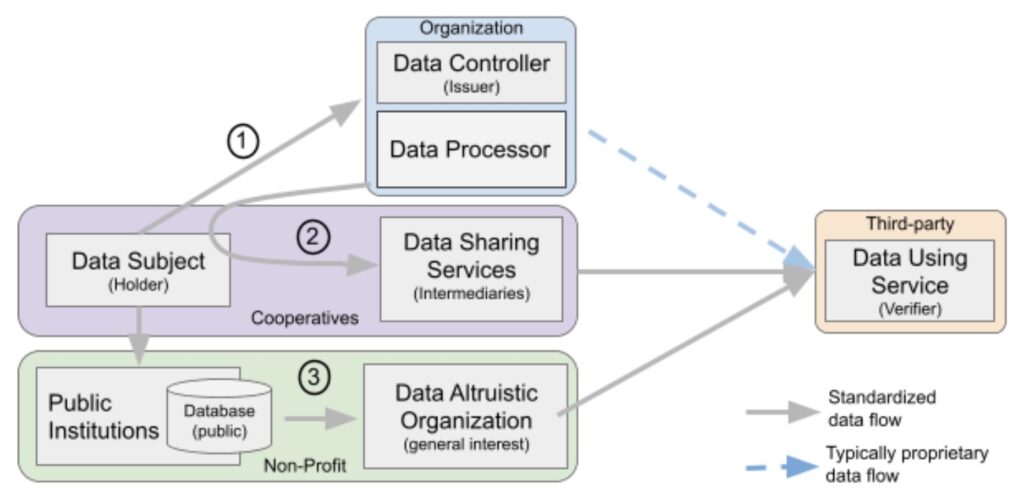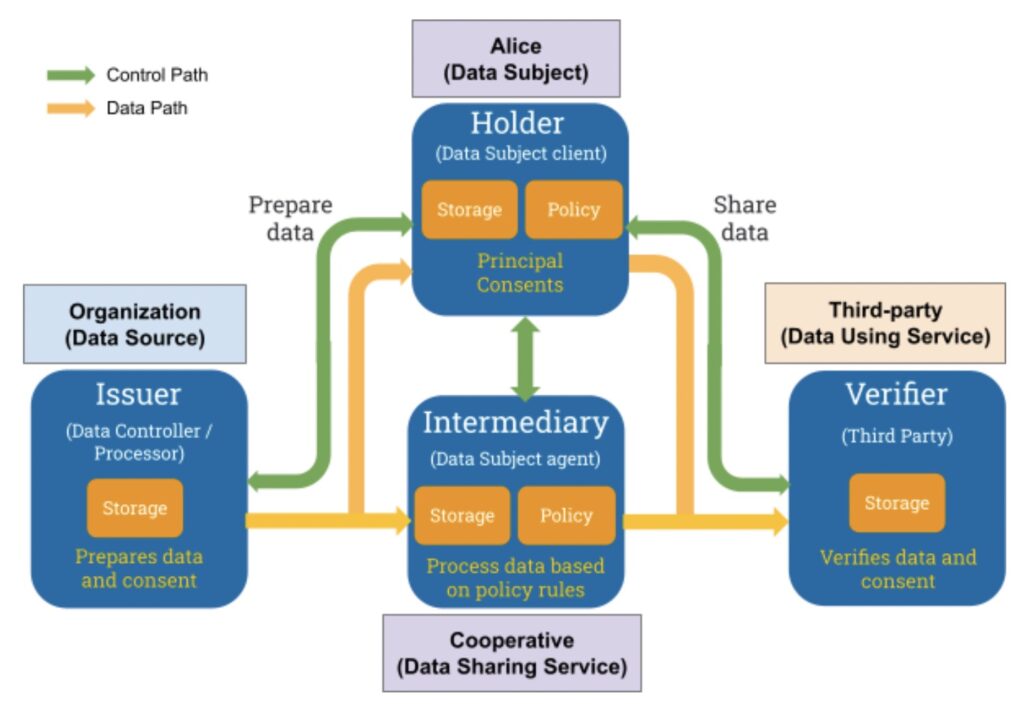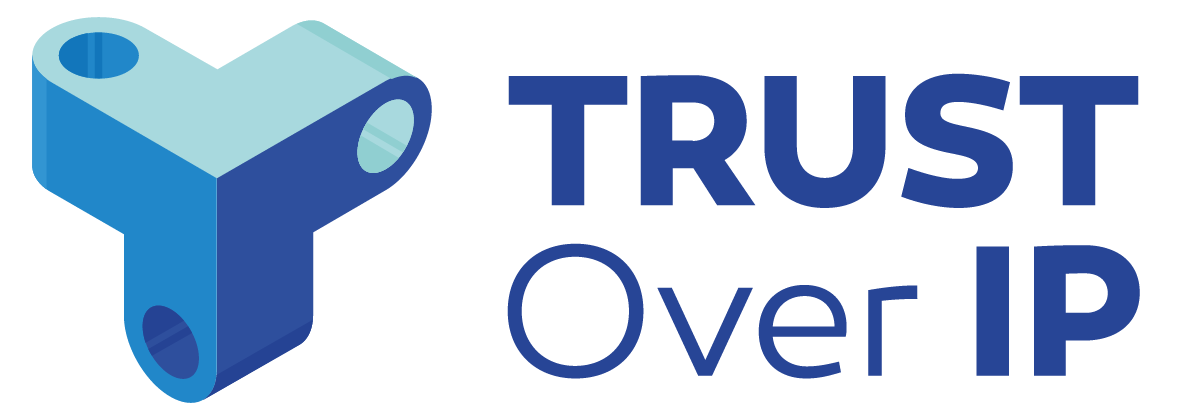by Jan Lindquist, Neil Thomson, Burak Serdar, Paul Knowles, Christoph Fabianek, Phil Wolff
Introduction
Europe’s Data Governance Act (DGA) reached a milestone. The European Parliament announced it “…reached a provisional agreement on a new law to promote the availability of data and build a trustworthy environment to facilitate its use for research and the creation of innovative new services and products.”
What does the Data Governance Act mean to the ToIP framework and the SSI community?
Background
The DGA defines an “intermediary” that facilitates processing and sharing of data for individuals and organizations to “…increase trust in data intermediation services and foster data altruism across the EU”. In the MyData framework for user-controlled data sharing, intermediaries are called MyData Operators and there is a certification program in place. (See references at the end of this blog post.)
The DGA intermediary has a trusting relationship with the individual. There cannot be any conflict of interest in sharing the data from the individual. In the eyes of the Act, the sharing of the data shall foster “data altruism” across the EU.
To achieve this goal, DGA provisions a certification program and rules for some public-sector data.
SSI Data Sharing Models
The Data Governance Act introduces new roles into data sharing and will set up the necessary governance for a more transparent and accountable data economy. Two main actors are introduced called Data Sharing Service or Intermediaries [refer to chapter III, Requirements Applicable to Data Sharing Service in Data Governance Act] and Data Altruistic Organizations [refer to chapter IV, Data Altruistic in same reference].
Neither of these actors shall have a financial incentive that conflicts with representing a Data Subject when personal data is made available to Third-parties or Data Using Service. The following diagram has three SSI data sharing models.
A business or organization collects personal data and shares it with a third-party often in proprietary and closed interfaces. A non-proprietary health care data exchange interface is FHIR from HL7 which created an open interoperable standard.
A cooperative or intermediary represents the individual when sharing personal data. The sharing shall be standardized and interoperable between different suppliers.
A non-profit organization, acting altruistically, facilitates sharing of data that are in the public institution’s domain. The public institutions may, for example, be health care systems.

Some similarities can be drawn with the Verifiable Credential model where the Data Subject is a Holder, an organization is the Issuer and a third-party is a Verifier.
The DGA adds intermediaries to the ToIP framework
The key difference is addition of the Intermediary. The Intermediary represents an agent for the Holder (Data Subject) which has direct control of processing of personal data through a policy engine. Figure 1 shows the ToIP framework with the actors introduced in the Data Governance Act.

Two layers or paths when performing data exchange are described in the diagram.
- A data path (yellow arrows) composed of Verified Credentials (VCs) and interfaces to a data repository.
- A control path (green arrows) that sets the conditions for personal data usage, given through a data subject consenting to collecting, processing or sharing of personal data.
Each actor in the diagram has three different role types: a data role, a Distributed Ledger Technology (DLT) role, and a privacy role.
- The data role represents Data Subject who the collected data relates to, the Data Source that collects the data, the Data Sharing Service that processes the data prior to sharing the data, and Data Using Service which provides services based on the shared data.
- In addition to the standard DLT roles an additional role called Intermediary is introduced. As described before, the Intermediary facilitates the processing of data on behalf of the Data Subject prior to sharing with a third party.
- The privacy roles are the standard Data Controller/Processor, Data Subject, and Third-party. To better understand the Data Subject, it is split into two, a client and an agent. The Data Subject has direct control via the Client. The Agent allows the Data Subject to delegate control to the Agent (as a proxy).
The final aspect to understand are the key functions to enable the Intermediary to act on behalf of the Data Subject. The Intermediary requires a privacy function that applies the transformation and the privacy control selected by the Data Subject. For example the Data Subject may give consent to processing anonymized personal data that would be controlled by the privacy engine. The storage function may be in a wallet or a pseudonymized database with restricted access.
Summary
While it may look like most of the work in ToIP relate to VC’s, there is also the work from Inputs and Semantics work group that look at standardizing the storage, portability of the personal data, and creating a layered schema that helps with setting the policy engine when preparing and sharing of the data.
The Data Governance Act can be supported based on the technology being promoted in ToIP Working Groups. The work underway in ToIP Working Groups are aligned with the specific requirements of the Data Governance Act. Both ToIP and the DGA are avoiding a pervasive data ecosystem that promotes the surveillance economy. We both put a data exchange with humans at the center of any data transfer.
A future blog post will look at the Digital Markets Act in relation to ToIP. When an organization exceeds a threshold of users and net income, they are required to adhere to the rules of a Gateway stipulated by the Digital Markets Act. More in the next post.
References
- Promoting data sharing: presidency reaches deal with Parliament on Data Governance Act, November 30th 2021
https://www.consilium.europa.eu/en/press/press-releases/2021/11/30/promoting-data-sharing-presidency-reaches-deal-with-parliament-on-data-governance-act/ - HL7 FHIR
http://hl7.org/fhir/ - REGULATION OF THE EUROPEAN PARLIAMENT AND OF THE COUNCIL on European data governance (Data Governance Act), November 25th 2020
https://eur-lex.europa.eu/legal-content/EN/TXT/?uri=CELEX%3A52020PC0767 - MyData Operators
https://mydata.org/mydata-operators/ - Digital Governance Act proposes sharing data for the public good and selflessness – the concept of Data Altruism, January 28th 2021
https://eudatasharing.eu/news/digital-governance-act-proposes-sharing-data-public-good-and-selflessness-concept-data - The Digital Markets Act: ensuring fair and open digital markets
https://ec.europa.eu/info/strategy/priorities-2019-2024/europe-fit-digital-age/digital-markets-act-ensuring-fair-and-open-digital-markets_en
